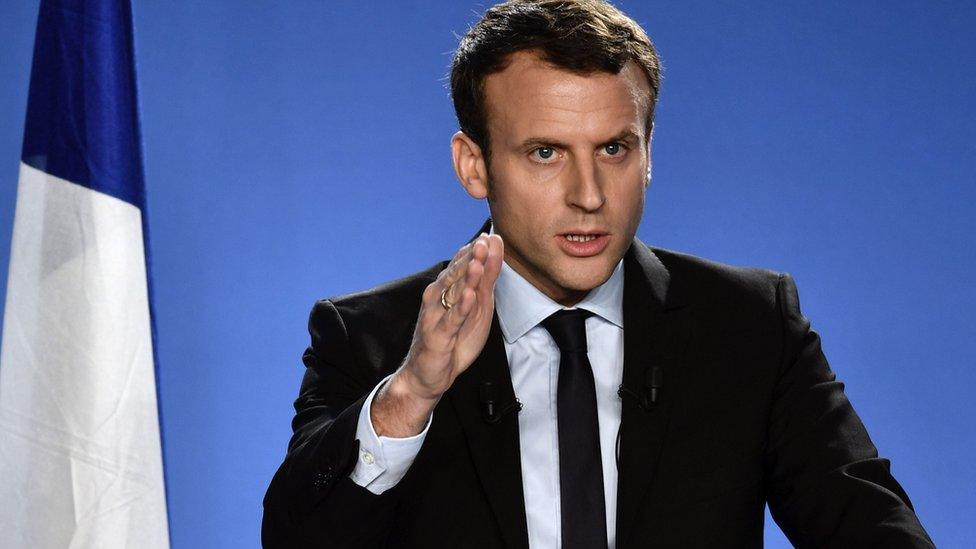Juppe v Fillon: Battle of France's conservatives
- Published
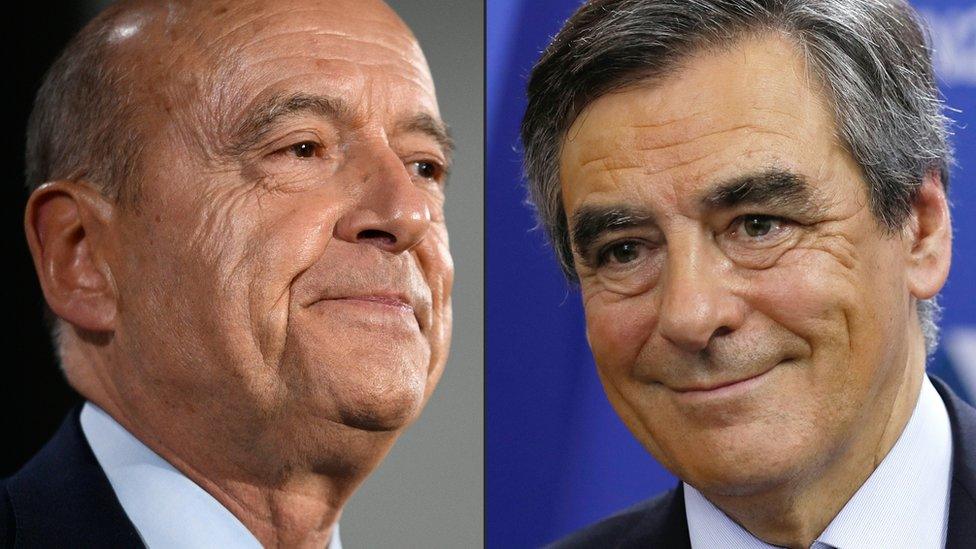
French conservative rivals Alain Juppe (L) and Francois Fillon
The race to be the French conservative candidate for president is now between two ex-prime ministers. Both want big public sector cuts and business incentives, including lower taxes, to re-energise the economy.
Free-market fan Francois Fillon stunned observers when he came from behind to win the first round of the primary vote on Sunday 20 November - with 44% of the vote, comfortably leaving the former favourite, Alain Juppe, in his wake with 28%.
The last week of campaigning was marked by personal attacks between the self-declared friends. Mr Juppe attempted to claw back lost ground by highlighting Mr Fillon's social conservatism.
But polls suggest Mr Fillon is the favourite to win the runoff vote on 27 November.
The Republican candidate is widely expected to face far-right National Front (FN) leader Marine Le Pen in the presidential election runoff vote next May. But what are the main differences between Mr Fillon and Mr Juppe?

Francois Fillon
Mr Fillon, 62, was very much overshadowed by President Nicolas Sarkozy when he served as prime minister in 2007-2012.
His success in the first stage of the primary vote - and Mr Sarkozy's shock defeat - was the result of strong performances in the three TV debates. He projected a "calm, statesman-like" image, according to Prof James Shields, a French politics expert at Aston University. "He came across as a conviction politician, without theatricals."
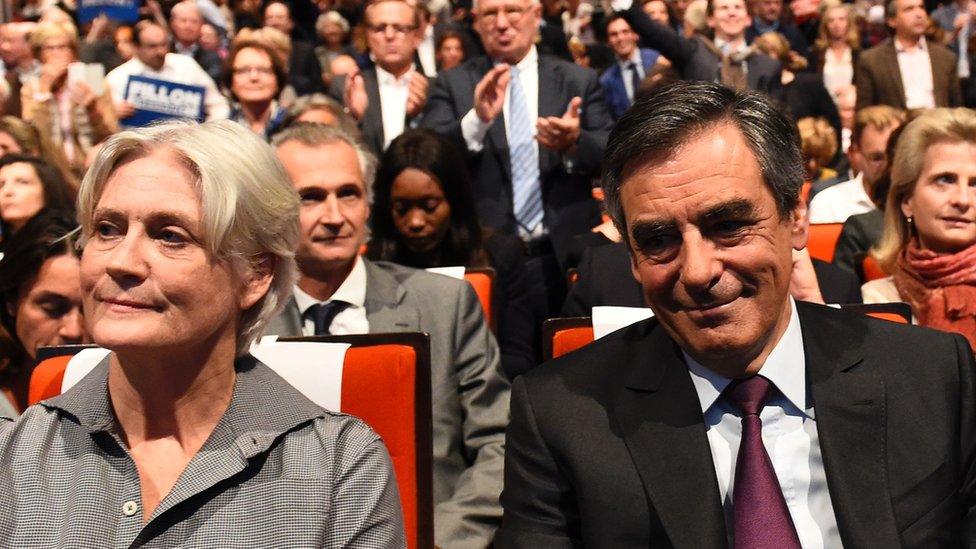
Francois Fillon met his Welsh wife Penelope while she was studying law in Paris
His strong performance continued in the last TV debate, with pollsters reporting voters of all political persuasions giving him the edge over Mr Juppe.
Despite his five years as prime minister, for many French voters Mr Fillon was still rather an unknown quantity. That was an advantage, compared with the controversies that have dogged Mr Sarkozy and Mr Juppe, says Prof Shields.
"Francois Fillon's values are quite old-fashioned. He is a French bourgeois type, who got the support of more traditionalist Catholic groups," according to Prof Philippe Marliere, who teaches French politics at University College, London.
Mr Fillon is not especially charismatic but he is doing well now because "French conservatives have shifted to the right, they want someone who is more neoliberal and tougher on identity politics", Prof Marliere told the BBC.
That shift was influenced by the hardline positions of Mr Sarkozy and Ms Le Pen on immigration and national security, he said.
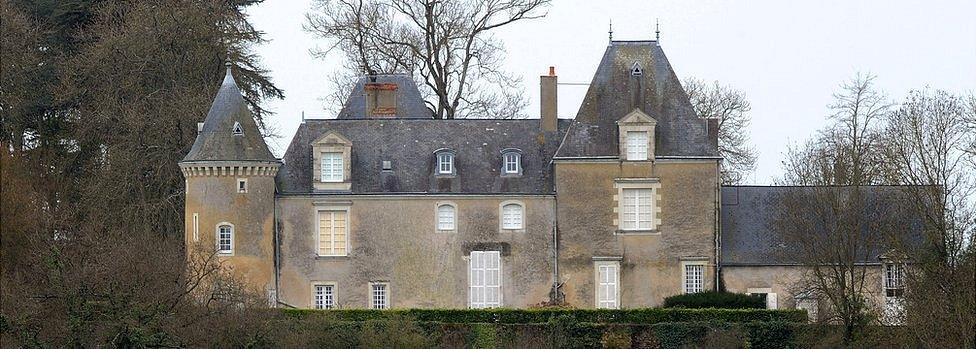
Mr Fillon's home: Medieval Chateau de Beauce, in Solesmes, western France
Mr Fillon studied law and has a Welsh wife, Penelope Clarke, whom he married in 1980 in Llanover, near Abergavenny. They have five children and their home is a 12th-Century manor house near Le Mans in western France.
Soundbites:
"One of the goals of marriage as an institution is to provide security for children. That goal, to me, does not appear compatible with homosexual couples."
"Our 'normal' president [Francois Hollande] needs to understand that there is nothing normal in the world where he is now one of the major players. He needs to take risks and give up his bourgeois and Atlanticist postures, which belong to the Cold War era."
Key policies:
Cut 500,000 public sector jobs over five years, in an austerity drive to cut public spending by €100bn (£85bn; $106bn)
End the 35-hour week, to allow staff to work up to 48 hours maximum
Raise the retirement age to 65 progressively (from 2018, under current plans, it will be 62 for most French workers)
Cut social charges that businesses pay, to the tune of €40bn
Strip jihadists returning from wars in Iraq or Syria of their French nationality
Scrap the wealth tax (ISF), which President Hollande increased
Change the law so that children adopted by male homosexual couples can trace their birth mother
Engage with Russia by lifting sanctions and help Syrian President Bashar al-Assad to defeat so-called Islamic State (IS)

Alain Juppe
Mr Juppe, 71, tied his political fortunes to the career of ex-President Jacques Chirac. He paid the price for that when, in 2004, he was given an 18-month suspended jail sentence for his role in an illegal party funding scam when Mr Chirac was mayor of Paris.
The conviction brought with it a 10-year ban from holding political office, later cut to just one year.
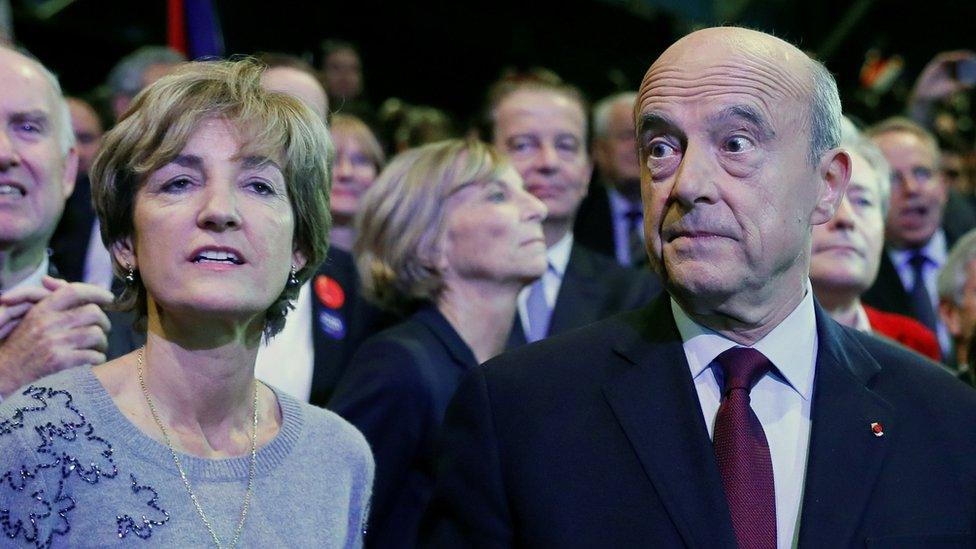
Alain Juppe and his wife Isabelle: The mayor of Bordeaux is seen as a centre-right moderate
In the mid-1990s, as prime minister, Mr Juppe attempted reforms to the welfare system and public sector that triggered crippling strikes. Transport was paralysed, schools and hospitals were shut, and the government lost the elections.
Since 2006 he has been mayor of Bordeaux, his home region in the south-west and power base.
He hails from a farming family and attended the elite National Administration School (ENA). He divorced his first wife in 1993, and married Isabelle Legrand-Bodin, a journalist. He has three children.
Prof Marliere says Mr Juppe's campaign for the primary was "rather low-key" and he "looked a bit like a grandfather", though like Mr Fillon he also appeared calm and moderate compared with Mr Sarkozy.
Mr Juppe was "badly burned" by the 1990s unrest over welfare reform, Prof Shields says.
That may explain why his targets for reining in the public sector and boosting business are less radical than Mr Fillon's. He believes Mr Fillon's target for job cuts is unachievable.
Soundbites:
"Our democracy is really shaky. It is only advancing on one leg. It is failing to represent more than half of all citizens."
"My method remains constant: 'Placate, rally and reform'. Placate to rally people, and rally in order to reform. Compared with many other countries we have too often had a divisive approach."
Key policies:
Cut up to 300,000 public sector jobs
Raise the retirement age to 65 (a target he shares with Mr Fillon)
Raise sales tax (VAT) by 1% (Mr Fillon wants a 2% rise)
Scrap the wealth tax (ISF) and slash businesses' social charges, including a €10bn cut in family benefits
Suspend benefits for parents who allow their children to skip lessons
Introduce immigration quotas (another policy he shares with Mr Fillon)
Maintain the EU's tough stance towards Russia and its alliance with President Assad.
- Published21 November 2016
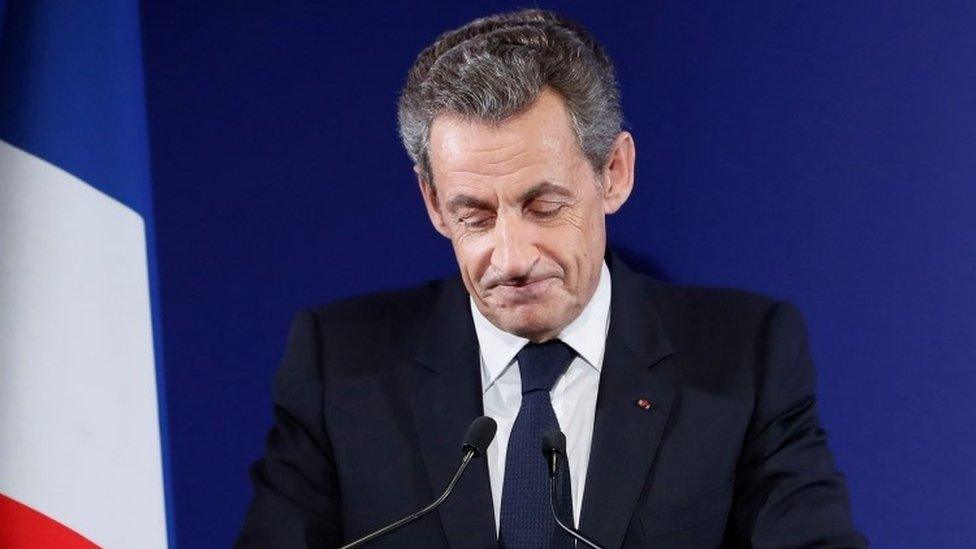
- Published19 November 2016
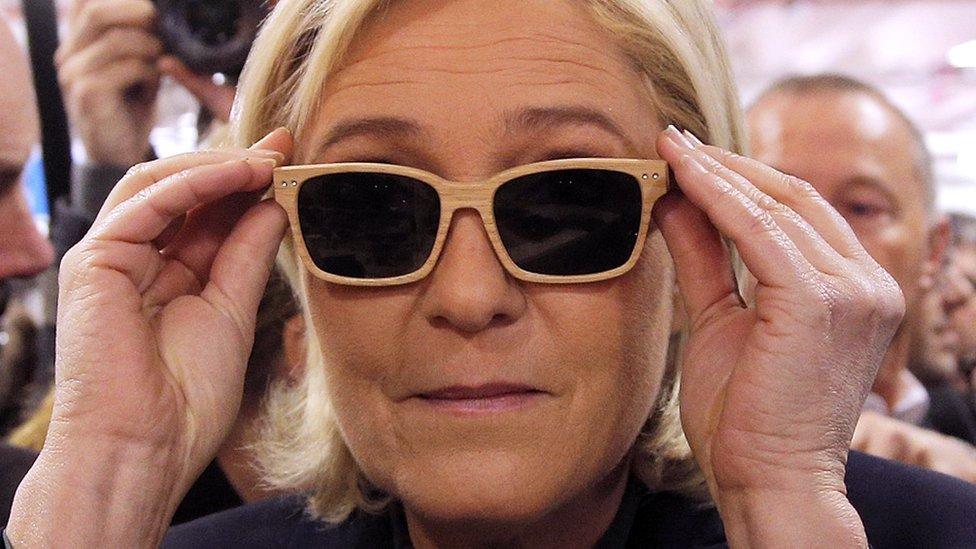
- Published16 November 2016
